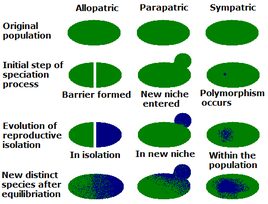How does speciation occur?
1 Answer
Speciation occurs when two or more populations become so genetically distinct that they no longer interbreed with one another.
Explanation:
Speciation occurs when two or more populations become so genetically distinct that they no longer interbreed with one another.
There are multiple ways this can occur. The natural ways speciation can occur are allopatric, parapatric, and sympatric speciation. (Note: speciation can also occur unnaturally in the laboratory or due to selective breeding and so forth).
 http://thenorthernfencelizardresource.weebly.com/taxonomyevolution.html
http://thenorthernfencelizardresource.weebly.com/taxonomyevolution.html
Allopatric speciation is when populations become separated geographically and diverge over time due to natural selection, mutations, and genetic drift within each population.
For example, if a river changes its course over time and two populations of a species that used to interbreed and exchange genes no loner exchange genes (because they can't or don't want to cross the river), those two populations will evolve separately and become distinct species.
Parapatric speciation occurs when two populations are not completely separated. Two populations are largely separated from one another but occasional contact still occurs. However, interbreeding between the two populations is disadvantageous and results in offspring with lower fitness.
Sympatric speciation occurs when there is no geographical barrier but populations diverge regardless. If certain individuals decide to exploit a new niche, over time, they may differ substantially from their main population that they no longer interbreed. There is debate surrounding on often true sympatric speciation occurs. Read more about sympatric speciation here.

